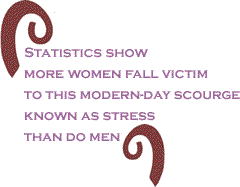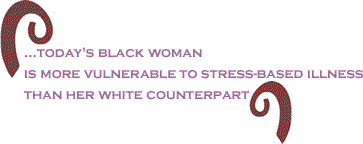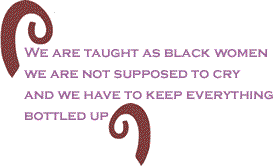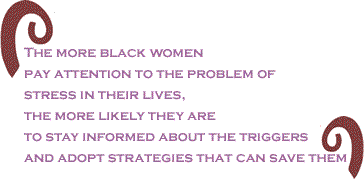
|
|||||||||||||||||||||
 |
|||||||||||||||||||||
 |
|||||||||||||||||||||
 |
|||||||||||||||||||||
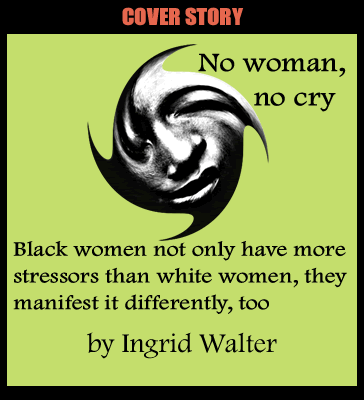 |
|
It has been described as the silent killer, North America's epidemic, affecting all who fall in the path of its sometimes lethal sword. It wreaks havoc with our immune systems, causes coronary heart disease, gastrointestinal problems, hastening cancers and psychological illnesses. Statistics show more women fall victim to this modern-day scourge known as stress than do men. But North American black women face an even bleaker picture. Growing evidence shows, despite gains in employment and education, today's black woman is more vulnerable to stress-based illness than her white counterpart. Like white women, black women confront common and chronic stressors such as sexism, juggling work and family demands and managing limited finances. But racism in larger society and classism and sexism in their own environments make the black woman's stress burden a much heavier one. "We live with chronic stress that is killing us," says Dr. Marilyn Hughes Gaston, former U.S. assistant surgeon general. She is part of the International Black Women's Congress 22nd annual conference at the Holiday Inn today to Sunday. Racism, its attendant discrimination and bias are all chronic stressors that force the body to adjust in very dangerous ways, says Gaston, who co-wrote Prime Time, a book to help midlife black women manage stress and take charge of their lives. Mary, an African Canadian teacher, whose name has been changed to protect her identity, worked successfully at a Toronto school board for 17 years with multi-ethnic students and teachers. Stress-related health issues hit her in 2003 after moving to another board, with a "98 per cent white" population.
"I was the first black teacher they ever encountered at that school. The level of racial discrimination and abuse (and) even physical confrontation was so depressing that I had to end up taking a leave from the school." Parents confronted her about her qualifications (though she came from Montreal), her years of experience and challenged her with scholastic questions. "I had these parents who were challenging me and who acted in a demeaning, derogatory, racist way. I had one parent push me aside when I was in a face-to-face discussion," she says. This happened at parent-teacher interviews reviewing the children's progress. "Many of the children in my class started to treat me in a way indicative of their parents ... as time progressed children became increasingly belligerent, disrespectful, totally out of order," she says. Mary's principal and physician supported her perceptions about the cause of her stress. But she says, "It affected me emotionally, spiritually, physically to the point where I would come home to my family, my husband and be very distraught and be unable to sleep. I had stomach pains and it affected me on many different levels." Scientific data showing a direct link between stressors like racism and ill health is surfacing in the U.S. and Canada. "What we're finding is that black women are living with everyday racism and it's not the one or two incidents that happen, it's the accumulated effect of racism that is having an impact on their health and well-being," says Dr. Wanda Thomas Bernard, director of the School of Social Work at Dalhousie University in Halifax. Of a sample of 479 women aged 18 and over from Toronto, Halifax and Calgary, 31 per cent reported experiencing high levels of racism-related stress and 35 per cent reported moderate levels. The data also shows a significant correlation between stress and emotional ill health. Seventy-five per cent of black women who reported high racism-related stress reported poor emotional health, according to early findings. Funded by the Canadian Institute of Health Research, the project is a $1.25 million study of the impact of racism on the health of indigenous black Canadians, immigrant African and Caribbean Canadians.
"We are also seeing the impact on the spiritual side, women talking about their spirit being dampened," adds Bernard. That's a stressor that Helen Pearman Ziral, a PhD student at the University of Toronto, describes as "spirit injury." "Spirit injury is the pain you feel that you bury if someone says something to you or looks at you or ignores you and you sense it is because you are a woman of African descent," says Ziral. She plans to examine the correlation between " spirit injury" and autoimmune diseases, which she says are affecting several black women with whom she has contact. Sharon is an African Canadian who worked at a big firm in the petroleum industry in the 1980s. "Depending on colour you would be in certain jobs. For black women, those were administrative support jobs. None in management. Even those trying to get out couldn't," says the woman, who also used a pseudonym. "One in accounting couldn't get an opportunity to get the practical experience on the job to take her ...exams." Sharon eventually left the company and the sector and is now an IT consultant. With race and gender stressors come socio-cultural factors that can hinder or help, says Ziral. She herself experienced abuse in a previous relationship. "He would discourage me from wearing any makeup or clothing that would make me look attractive," she says of her ex-partner. "He would call me names and insult me and would tell me that my skills and expertise meant nothing. I started to buy into it and not sharing these stories with my friends." Her research on spirit injury brings her in contact
with black women who have faced similar abuse and others who have
been raped by fathers, stepfathers and boyfriends. Like them, Mary, who took long walks, sought cultural comfort in African drumming classes and cried to help her heal from her wounds, agrees. "We are taught as black women we are not supposed to cry and we have to keep everything bottled up," she says. Dr. Gayle Porter, clinical psychologist and co-author of Prime Time, says black women often show stress differently than white women. "Most of us in the mental health field were trained to think that when a person becomes depressed they eat less, they become withdrawn, they start thinking about suicide when the depression becomes major. However, with black women, some have these symptoms but more often we gain weight, we eat more, we become more agitated and angry, instead of more withdrawn and confused. We start thinking about death but not necessarily suicide. Black women may be depressed but (might) not recognize it and neither might a health professional," says Porter. That's why it is important black women pay attention to their behaviour and their bodies to prevent stress from exacerbating existing illnesses or causing new ones, adds Porter. Other behavioural signs of stress amongst black women, Porter has found, are increased time spent watching television, shopping and gambling sprees.
To manage stress, Porter and Gaston recommend women exercise a minimum of 30 minutes a day. "We also now know that the process of deep breathing can physically reverse chronic stress," says Porter. She suggests starting the day with meditation, reading religious books, a serenity prayer. Eat balanced meals, reduce drinking, eating junk food and listening to or watching a great amount of negative news, she says. The perception and reality of crime are stressors, too. Single mom Suzette Cadougan's 4-year-old son (now 6) was shot while playing outside his mother's Driftwood Ave. home in a public housing complex in the Jane and Finch neighbourhood in 2005. "When Shaquan got shot my whole life changed. It messed up my whole system, my thinking, the things I used to do I don't do anymore. I still have the fear and I go to the doctor because I have a lot of pressure at the back of my head. Every time I see shootings like in Montreal and these shootings on television and all the violence it takes me back to the day my son got shot. He still cries a lot and says he wants the bullet out of him." "As a mother, I know talking to friends, once their boys reach a certain age they are looked at as little criminals in the mainstream. That is a stress for a lot of women," says Sharon, who is a middle-class single mother, whose husband is involved in raising their daughter. However, women like Sharon say they want other issues surrounding their stress dealt with besides guns and gangs, as they are tired of the stereotype. As Canadian and American women grapple with the stress they face from family, work, finance, race, gender and culture issues, there seems to be a consensus: The more black women pay attention to the problem of stress in their lives, the more likely they are to stay informed about the triggers and adopt strategies that can save them. Details: The 22nd annual conference of the International Black Women's Congress will be attended by women from Canada, the U.S. and Africa. Its stated goal is to help women of African descent define themselves to better manage the challenges they face in the 21st century. For details, call 416-604-5647 or email: ibwccanada56@ rogers.com. Ingrid Walter is a freelance journalist and columnist. She can be reached via email at [email protected]. This article originally appeared in the Toronto Star. |
|
| Home | |
Your comments are always welcome. Visit the Contact Us page to send e-Mail or Feedback or Click here to send e-Mail to [email protected] e-Mail re-print notice
If you send us an e-Mail message we may publish all or part of it, unless you tell us it is not for publication. You may also request that we withhold your name. Thank you very much for your readership. |
|
| September 28, 2006 Issue 199 |
||||||||||||||
|
||||||||||||||
|
||||||||||||||
| Printer Friendly Version in resizeable plain text format | ||||||||||||||
 |
||||||||||||||
 |
||||||||||||||
 |
||||||||||||||
 |
||||||||||||||
| |
||||||||||||||
| |
||||||||||||||





















